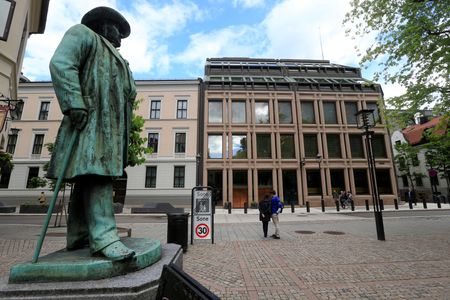OSLO (Reuters) – Norway’s central bank said on Thursday it plans to raise its key policy interest rate in March, maintaining a campaign of tightening that began last year as the economy recovers from the pandemic.
Norges Bank’s five-member monetary policy committee unanimously agreed to keep the rate on hold at 0.5% for now, as expected in a Reuters poll of economists.
“Based on the committee’s current assessment of the outlook and balance of risks, the policy rate will most likely be raised in March,” Governor Oeystein Olsen said in a statement.
Norges Bank last month raised its deposit rate for a second time since September and said it aims to lift the benchmark a further three times in 2022, placing it among the most aggressive rate setters in the developed world.
The crown currency weakened slightly to 9.97 against the euro at 0911 GMT from 9.96 just before Norges Bank’s announcement.
It maintained the plan for more hikes despite a surge in coronavirus infections led by the Omicron variant, highlighting the central bank’s desire to touch the breaks on a rapidly growing economy.
Following the Omicron outbreak, the Norwegian government last month re-imposed restrictions on social gatherings at restaurants and entertainment venues, but some of those measures have already been rolled back.
“Relaxations of containment measures will likely contribute to a continued economic upswing,” Norges Bank said, while adding that underlying inflation has risen more than expected and is now close to the central bank’s target.
“A gradual normalisation of the policy rate is consistent with continued high employment. Higher interest rates will also help counter a build-up of financial imbalances,” the central bank said.
Thursday’s rate decision was expected to be the last one presided over by Oeystein Olsen, who is due to retire at the end of February.
Among the favourites to replace him are Norges Bank deputy chief Ida Wolden Bache and NATO Secretary General Jens Stoltenberg. The government is expected to announce its decision soon.
(Reporting by Victoria Klesty, editing by Terje Solsvik and Emelia Sithole-Matarise)











